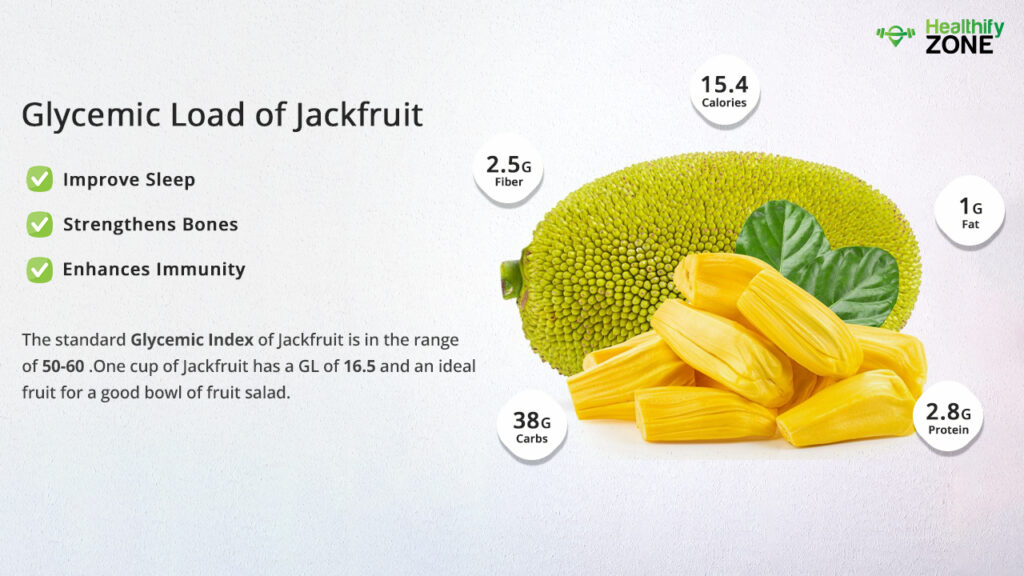On a scale of 100, the medium glycemic index (GI) of jackfruit is between 50 and 60. Indian-born jackfruit is a wonderful fruit that is becoming more and more popular around the world as a meat substitute. It is a massive fruit with golden meat and rough green skin that routinely ripens to 20–55 pounds or 10–25 kg.
The jackfruit is full of vitamins, minerals, proteins, phytochemicals, carbs, and other nutrients. It is also seen to be a substitute by vegans and vegetarians because it contains shredded meat.
Before including jackfruit in their diets, persons with diabetes need to be aware of how it may impact their blood sugar levels. Additionally, jackfruit treats constipation, stomach problems, and high blood pressure. Due to its high fiber content, which lowers appetite and hunger cravings, this remedy works.
Is Jackfruit Safe for Diabetes?
Jackfruit is beneficial to diabetics since it includes chemicals that lower blood sugar levels. Additionally, in-vivo research showed that compounds in jackfruit leaves prevent diabetic complications, and clinical trials showed that persons with diabetes who received jackfruit extracts had improved glucose tolerance.
According to the available preliminary data, jackfruit leaves can be used to manage diabetes and stabilize levels of blood sugar. Additionally, jackfruit seeds have a low GI and are a fantastic source of nutritional fiber.
A meal with a low glycemic index won’t cause a blood sugar surge. When eaten from a home garden, jackfruit or kathal is safe because it isn’t contaminated or raises blood sugar levels. The same jackfruit is detrimental for diabetes because it includes refined sugar, which is bad for health, whether it is canned, processed, or treated with sweeteners. As a result, diabetics can consume jackfruit seed chutney or dry, barbecued jackfruit seed powder, which can also be added to smoothies and salads.

Is Jackfruit Suitable for Weight Loss?
If eaten properly, jackfruit can aid in weight loss. Due to its high fiber content, jackfruit assists with weight loss by enhancing digestion and metabolism. One cup of sliced jackfruit has roughly 155 calories, which is not excessive. One cup of jackfruit has roughly 40 g of carbs, which makes it unsuitable for the keto diet, a highly popular weight loss plan. It does, however, provide additional advantages for weight loss that cannot be disregarded.
What is the Best time to Consume Jackfruit?
Due to the fructose in fruit, jackfruit has a similar natural sweetness as other fruits. Eating it in the morning (between 11 am and noon) is preferable, and the recommended serving size is no more than what fits in one palm. As a result, you can consume jackfruit seed preparations (powder/chutney) twice weekly, but only once a week can you consume any jackfruit flour dish like idli or dosa.
The Bottom Line: The Glycemic Index of Jackfruit is 50-60
The rich vitamin C and antioxidant content of jackfruit strengthen your immune system’s ability to fight off infections. Find out more about foods that are high in antioxidants. Jackfruit is rich in healthy carbs and has 94 calories per 100 grams. Upon ingestion, it gives you an immediate energy boost. Jackfruit has incredibly simple-to-digest carbohydrates that are actually quite good for our bodies.
Since potassium coordinates and maintains muscular activity, including that of the heart muscles, it is crucial for a fully working system. A healthy amount of potassium provides a balanced regulation of sodium in our bodies, which, if left uncontrolled, can harm the arteries and the heart.
Since jackfruit is high in potassium, it supports heart and circulatory system health. Jackfruit is abundant in both soluble and insoluble fibers. Eating a good quantity of fiber in each of your daily meals is crucial. Our body quickly breaks down soluble fiber to produce energy, while insoluble fiber gives your stool volume to make bowel movements easier.
Antioxidants, phytonutrients, and flavonoids are abundant in jackfruit. These antioxidants get rid of the free radicals that are bad for us and the poisons that the body produces. Free radicals and poisons have both been linked to the development of cancer in humans.